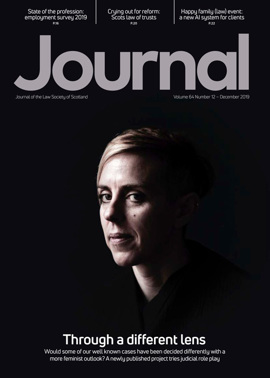Opinion: Jamila Archibald
On my first day of traineeship, I agonised over whether to wear my afro hair out or secure it back. This was not a question of vanity, but rooted in a deeper nervousness as to whether I would “fit in”.
I have grown to realise that apart from my skin colour, the biggest signifier of my race is my hair. Instances have been reported of women being told to choose between their afro hair and their job. Since childhood I have heard comments that my hair is “wild”, “crazy”, or looks “like a sheep”, so I identified with these women. I was anxious that these comments would carry into my professional life, and did not want my potential to be doubted just because I look different, as others in the African and Afro-Caribbean community have experienced.
Yet it was important that I remained true to my authentic self. Perceptions cannot be changed if we conform to what is considered the norm. The issue may seem minor, but to me wearing my natural hair out recognises the beauty in my blackness and pride in my ancestry: a small, but important, celebration.
I felt intimidated joining the legal profession, self-conscious about being a mixed-race, state-educated woman, and the first in my family to attend university. However, I took the initiative to secure work experience and build my connections. A year into my traineeship, my self-confidence is growing. While invisible barriers exist, they will not prevent me from being successful: part of success to me is combating presumptions about what a lawyer is “supposed to be” and helping create a space in which all identities feel they belong.
I am not the first to hold such fears. The Law Society of Scotland’s 2018 Profile of the Profession report states: “Students from Black, Asian and Minority Ethnic (BAME) communities are disproportionately over-represented on the LLB per head of population”. However, comparatively few BAME solicitors attain senior roles. The majority of respondents blamed unconscious bias.
It is important in a workplace to see people in senior roles with whom you identify. Their success encourages you to believe in your own potential. As a woman, I am inspired every day to see many strong, female leaders in my firm. As a black woman, I feel lonely when I fail to see my race reflected in senior positions. I am often the “only” in the room. I sometimes feel a strange sense of accomplishment. However, I put pressure on myself to overperform so that assumptions about my race or gender never become an obstacle to my career.
I have learned that while we cannot control people’s perceptions of us, we can choose how we respond. We should not let assumptions about any of our characteristics – race, gender, religion, sexuality, disabilities or social background – define us. Rather, we should use them to help our workplaces evolve. Since starting as a trainee, my focus has shifted
from being afraid of the barriers to how I can contribute to overcoming them, for myself and others.
It begins with reminding ourselves and our colleagues why diversity is crucial in a workplace. Lawyers must represent the society they serve. A workplace full of people with the same characteristics inevitably generates the same opinions and ideas.
A culturally diverse staff ensures colleagues have a broader understanding of different cultures, and the different things that matter to different people. This is vitally important to clients and colleagues alike. Diversity ensures that a range of perspectives contribute to the firm overall, and innovation and progress result.
We all have hopes and aspirations. However, for these to be attained we must have opportunity. Increasing diversity begins with ensuring that everyone in our community has fair access to the legal profession. I feel privileged to work for a firm that provides a platform for different voices. We should not be bystanders, but actively encourage our employers to provide opportunities, and make use of them.
Diversity is a work in progress, but one action we can effect immediately is to make all colleagues feel included. Verna Myers, lawyer, author and Vice President of Inclusion Strategy at Netflix, explained it beautifully: “Diversity is being invited to the party; inclusion is being asked to dance.”
In celebrating different cultural events, we let our colleagues know they are supported, and that what is important to them is also important to us. It’s about both recognising our differences and telling our colleagues we want to learn. We are brilliantly unique; we are equals.
I no longer fear being different. I wear my afro hair freely in the office, because being myself is the only way I want to belong.







